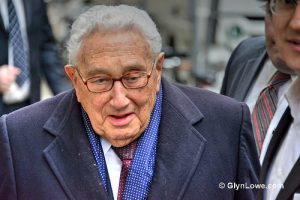
Views: 1884

The Chinese have a genius for pithy expressions and few are more packed with meaning, while immediately understandable, than “paper tiger”. NATO is one, but paper tigers that overestimate their powers can be dangerous.
Some Russians are concerned that there are today more hostile troops at the Russian border than at any time since 1941. While this is true, it is not, at the moment, very significant. The Germans invaded the USSR with nearly 150 divisions in 1941. Which, as it turned out, were not enough.
 Today NATO has – or claims to have – a battle group in each of the three Baltic countries and one in Poland: pompously titled Enhanced Forward Presence. The USA has a brigade and talks of another. A certain amount of heavy weaponry has been moved to Europe. These constitute the bulk of the land forces at the border. They amount to, at the most optimistic assessment, assuming everything is there and ready to go, one division. Or, actually, one division equivalent (a very different thing) from 16 (!) countries with different languages, military practices and equipment sets and their soldiers ever rotating through. And, in a war, the three in the Baltics would be bypassed and become either a new Dunkirk or a new Cannae. All for the purpose, we are solemnly told, of sending “a clear message that an attack on one Ally would be met by troops from across the Alliance“. But who’s the “message” for? Moscow already has a copy of the NATO treaty and knows what Article V says.
Today NATO has – or claims to have – a battle group in each of the three Baltic countries and one in Poland: pompously titled Enhanced Forward Presence. The USA has a brigade and talks of another. A certain amount of heavy weaponry has been moved to Europe. These constitute the bulk of the land forces at the border. They amount to, at the most optimistic assessment, assuming everything is there and ready to go, one division. Or, actually, one division equivalent (a very different thing) from 16 (!) countries with different languages, military practices and equipment sets and their soldiers ever rotating through. And, in a war, the three in the Baltics would be bypassed and become either a new Dunkirk or a new Cannae. All for the purpose, we are solemnly told, of sending “a clear message that an attack on one Ally would be met by troops from across the Alliance“. But who’s the “message” for? Moscow already has a copy of the NATO treaty and knows what Article V says.
In addition to the EFP are the national forces. But they are in a low state: “depleted armies” they’ve been called: under equipped and under manned; seldom exercised. The German parliamentary ombudsman charged with overseeing the Bundeswehr says “There are too many things missing“. In 2008 the French Army was described as “falling apart“. The British Army “can’t find enough soldiers“. The Italian army is ageing. Poland, one of the cheerleaders for the “Russian threat” meme, finds its army riven over accusations of politicisation. On paper, these five armies claim to have thirteen divisions and thirteen independent brigades. Call it, optimistically, a dozen divisions in all. The US Army (which has its own recruiting difficulties) adds another eleven or so to the list (although much of it is overseas entangled in the metastasising “war on terror”). Let’s pretend all the other NATO countries can bring another five divisions to the fight.
So, altogether, bringing everything home from the wars NATO is fighting around the world, under the most optimistic assumptions, assuming that everything is there and working (fewer than half of France’s tanks were operational, German painted broomsticks, British recruiting shortfalls), crossing your fingers and hoping, NATO could possibly cobble together two and a half dozen divisions: or one-fifth of the number Germany thought it would need. But, in truth, that number is fantasy: undermanned, under equipped, seldom exercised, no logistics tail, no munitions production backup, no time for a long logistics build up. NATO’s armies aren’t capable of a major war against a first class enemy. And no better is the principal member: “only five of the US Army’s 15 armoured brigade combat teams are maintained at full readiness levels“. A paper tiger.
This reality was on display – for those who could see – in the “Dragoon Ride” of 2015. Intended “to assure those allies that live closest to the Bear that we are here“, it was a parade of light armoured vehicles armed with heavy machine guns. Although breathlessly covered in the US media (“Show the world some of the firepower the United States and its NATO partners have in Eastern Europe“), it is unlikely that any watcher who had served in a Warsaw Pact army was impressed by what was in effect a couple of dozen BTR-50s. And neither was the US Army when it thought about it: a rush program was put into effect to give the vehicles a bigger weapon. The first one was delivered a year later. So now the US Army has a few lightly armoured vehicles with cannons. Something like the Soviet BTR-80 of the 1980s. Meanwhile, the Russians have the Bumerang-BM turret. Years of kicking in doors and patrolling roads hoping there are no IEDs are poor preparation for a real war.
No wonder NATO prefers to bomb defenceless targets from 15,000 feet. But there too, the record is unimpressive. Consider NATO’s last “successful” performance against Libya in 2011. No air defence, no opposition, complete freedom of movement and choice of action; and it took 226 days! Kosovo, a similar air action against a weak opponent, took 79 days. Meanwhile the years roll by in Afghanistan and Iraq.
Not, in short, a very efficient military alliance even when it is turned on against more-or-less helpless victims.
But there is one obvious question: does NATO take all its Russian threat rhetoric seriously, or is it just an advertising campaign? A campaign to bring in £240 million from the Baltics, an extra eighty billion for the US military-industrial complex, US$28 billion for Poland, Patriot missiles for Sweden, billions for F-35s for Norway (but no hangars for them), spending increases in the UK, Germany, France, Canada, Czech Republic and so on. A Russian threat is good for business: there’s poor money in a threat made of IEDs, bomb vests and small arms. Big profits require big threats. As I have written elsewhere, Russia was thought to be the right size of threat – big enough, but not too big. And they thought it was a safe target too – remember Obama in 2015 and his confidence that Russia didn’t amount to much?
Or so they thought then. What is amusing is that NATO is starting to worry about what it has awoken: “aerial denial zones“, British army wiped out in an afternoon, NATO loses quickly in the Baltics, unstoppable carrier-killer missile, “eye-watering” EW capabilities, “black hole” submarines, generational lead in tanks, “devastating” air defence system, “totally outmatched“. Russian actions, both diplomatic and military, in Syria gave NATO a taste: the Russian military is far more capable than they imagined. And far better wielded. The phantom conjured up to justify arms sales and NATO expansion now frightens its creators. A particularly striking example comes from General Breedlove, former NATO Supreme Commander who did much to poke Russia: he now fears that a war “would leave Europe helpless, cut off from reinforcements, and at the mercy of the Russian Federation.” Not as negligible as they thought.
To what should we compare this weak, incompetent but endlessly boastful and belligerent alliance? In the past I have suggested that NATO is a drunk that drinks to cure the effects of its last bender. Is it a child in an endless tantrum, frightening itself with the stories it tells itself? Like the Warsaw Pact it is frightened of contradicting information or opinion and insists they be blocked. Certainly it is an exemplar of complacent self delusion: “Projecting Stability Beyond Our Borders” boasts about the Balkans, Iraq and Afghanistan. The unicorns roam free in NATOland.
There is no reason to bother to read anything that comes out of NATO Headquarters: it’s only wind. There is one response. And that is Libya. When they say stability, respond Libya. When they say terrorism, respond Libya. When they say peace, respond Libya. When they say dialogue, respond Libya. When they say values, respond Libya. NATO is dangerous in the way that the stupid and deluded can be. But, when its principal member starts demanding its members “pay their share”, and the people of five members see Washington a greater threat than Moscow, maybe its final days are upon us.
But incessant repetition becomes reality and that’s where the danger lies. Hysteria has reached absurd proportions: 2014’s “gas station masquerading as a country” decides who sits in the White House; directs referendums in Europe; rules men’s minds through RT and Sputnik; dominates social media; every Russian exercise brings panic. This would all be amusing enough except for the fact that Moscow doesn’t get the joke. While the NATO forces on their border may be insignificant at the moment, they can grow and all armies must prepare for the worst. The First Guards Tank Army is being re-created. I discuss the significance of that here. When it is ready – and Moscow moves much faster than NATO – it will be more than a match, offensively or defensively, for NATO’s paper armies. And, if Moscow thinks it needs more, more will come. And there will be no cost-free bombing operations at 15,000 feet against Russia. NATO’s naval strength, which is still real, is pretty irrelevant to operations against Russia. And still the paper tiger bares its paper teeth.
In other words – and I never tire of quoting him on this – “We have signed up to protect a whole series of countries, even though we have neither the resources nor the intention to do so in any serious way”. NATO has been kiting cheques for years. And rather than soberly examine its bank account, it writes another, listening to the applause in the echo chamber of its mind.
“Pride goeth before destruction, and a haughty spirit before a fall.” We can only hope that NATO’s coming destruction does not destroy us too.
Originally published on 2017-11-16
About the author: Patrick Armstrong was an analyst in the Canadian Department of National Defence specialising in the USSR/Russia from 1984 and a Counsellor in the Canadian Embassy in Moscow in 1993-1996. He retired in 2008 and has been writing on Russia and related subjects on the Net ever since.
Source: Strategic Culture Foundation
Origins of images: Facebook, Twitter, Wikimedia, Wikipedia, Flickr, Google, Imageinjection, Public Domain & Pinterest.
Read our Disclaimer/Legal Statement!
Donate to Support Us
We would like to ask you to consider a small donation to help our team keep working. We accept no advertising and rely only on you, our readers, to keep us digging the truth on history, global politics and international relations.
[wpedon id=”4696″ align=”left”]
FOLLOW US ON OUR SOCIAL PLATFORMS







